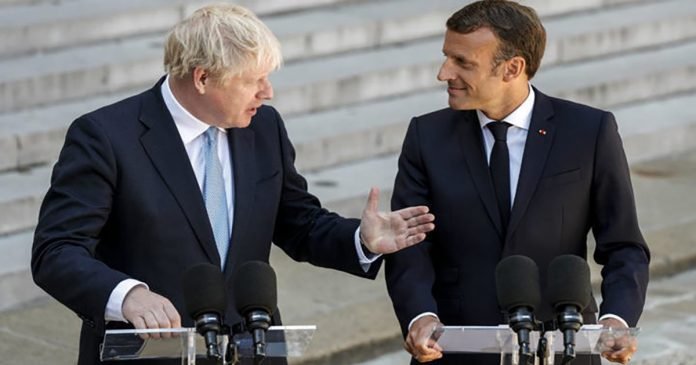France’s President Emmanuel Macron will host his British counterpart Boris Johnson for a working lunch to discuss Brexit and Iran ahead of the G7 meeting in France this weekend.
Boris Johnson is in Paris a day after Berlin offered a glimmer of hope that an agreement could be reached to avoid a chaotic “no deal” Brexit.
Speaking of the looming threat that Britain could crash out of the European bloc without an exit agreement in place, Johnson said: “Of course, I want a deal. And I think we can get a deal – and a good deal.”
But he added: “It is vital for trust in politics that, if you have a referendum, then you should act on the instructions of the voters. And that is why we must come out of the EU on October the 31st, deal or no deal.”
On the second leg of his first foreign visit since taking office, Johnson meet president Macron at the Elysee palace to press home his message that elements of the UK’s impending divorce from the European Union must be renegotiated.
Macron on Wednesday dismissed Johnson’s demands that the EU reopen negotiations on the Irish border, saying that the bloc had always been clear it would not agree.
“Renegotiation of the terms currently proposed by the British is not an option that exists, and that has always been made clear by (EU) President Tusk,” Macron told reporters in Paris.
At the weekend, all three European leaders will meet US President Donald Trump, a vocal supporter of both Brexit and Johnson, and the leaders of Canada, Italy and Japan at a G7 summit in the French seaside resort of Biarritz.
The talks come after Merkel on Wednesday told Johnson in Berlin that an agreement could even be possible within “30 days” for Britain to leave the EU, if a solution could be found to the thorny issue of the Irish border.
Boris Johnson has been adamant that he will not accept the “backstop” border plan agreed under his predecessor Theresa May and warned that the UK will exit the EU on 31 October, even at the cost of economic turmoil.
What the backstop?
The backstop is a mechanism to avoid border checks between EU member Ireland and Northern Ireland, part of the UK, with checkpoints there removed as part of a 1998 peace deal on the divided island.
But critics have derided the plan because it would temporarily keep Britain in the EU customs union.
In Berlin, Johnson again stressed his view that the backstop “has grave, grave defects for a sovereign, democratic country like the UK” and added that the provision “plainly has to go”.
Merkel said that the mechanism was always meant as a “fallback position” to protect the “integrity of the single market” for the period in which the other 27 EU members and London define their future relationship.
In the search for a solution, she said, “we have said we would probably find it in the next two years, but maybe we can do it in the next 30 days, why not? Then we are one step further in the right direction”.
Johnson told Merkel that he welcomed the “very blistering timetable of 30 days,” adding that “I’m more than happy with that”.
He added: “I just want to be absolutely clear with all our German friends and the German government that we in the UK want a deal, we seek a deal, and I believe we can do that.”
“Wir schaffen das,” he quipped, borrowing Merkel’s signature German phrase on managing the 2015 refugee influx that translates to “we can do it”.
Johnson, in a “do-or-die” gamble, has insisted Britain will leave the EU on 31 October , no matter whether it has ironed out remaining differences with the bloc or not.
Ahead of his Berlin visit, Johnson reaffirmed in a tweet that “we’re going to leave the EU on 31 October and make this country the best in the world to live in”. The message was adorned with a Union flag.
Support Independent Journalism Today
Our unwavering dedication is to provide you with unbiased news, diverse perspectives, and insightful opinions. We're on a mission to ensure that those in positions of power are held accountable for their actions, but we can't do it alone. Labour Heartlands is primarily funded by me, Paul Knaggs, and by the generous contributions of readers like you. Your donations keep us going and help us uphold the principles of independent journalism. Join us in our quest for truth, transparency, and accountability – donate today and be a part of our mission!
Like everyone else, we're facing challenges, and we need your help to stay online and continue providing crucial journalism. Every contribution, no matter how small, goes a long way in helping us thrive. By becoming one of our donors, you become a vital part of our mission to uncover the truth and uphold the values of democracy.
While we maintain our independence from political affiliations, we stand united against corruption, injustice, and the erosion of free speech, truth, and democracy. We believe in the power of accurate information in a democracy, and we consider facts non-negotiable.
Your support, no matter the amount, can make a significant impact. Together, we can make a difference and continue our journey toward a more informed and just society.
Thank you for supporting Labour Heartlands









